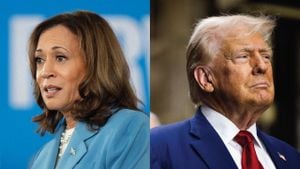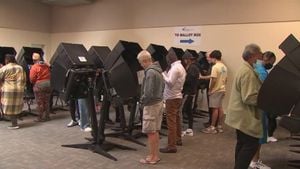The state of Michigan is once again poised to play a pivotal role as it gears up for the 2024 presidential election, with early voting numbers indicating significant voter engagement just days before ballots are cast on November 5. With past elections reflecting narrow victories and contentious races, the stakes are higher than ever as voters assess their options and influence the balance of power at both state and national levels.
Michigan's political climate has been increasingly dynamic, illustrated by the high early voter turnout reminiscent of previous election cycles. According to the Michigan Secretary of State, over 2.5 million voters have already participated, translating to approximately 35.5% of registered voters. This enthusiasm is echoed by Secretary Jocelyn Benson, who remarked, "I’m thrilled to see so many enthusiastic Michigan citizens turning out all across the state to make their voices heard." With the early voting period breaking records, many Michiganders are embracing the flexibility of multiple voting days rather than limiting themselves to just one.
Polling shows the contest between Democratic Vice President Kamala Harris and her Republican challenger, former President Donald Trump, remains exceedingly tight. Recent assessments reveal Harris leads Trump by just 0.5 percentage points, signaling once again how competitive this battleground state is considered. Harris’s recent campaign swings across Michigan are strategically aimed at galvanizing support from both young voters and minority communities, especially as turnout among these groups typically influences election outcomes.
Harris kicked off her weekend campaigning on Friday, making several stops, including one in Detroit, where she aims to solidify support as early voting winds down. Her presence attracts attention as she tailors messages to resonate with first-time voters and those disenchanted by past administrations. Meanwhile, Trump is gearing up for his traditional election-eve rally in Grand Rapids, emphasizing the importance of Michigan’s electoral votes and drawing crowds with his signature campaigning style.
Despite being considered more favorable for Democrats historically, Michigan showcases contentious races beyond the presidential election. The state is seeing competitive congressional races, especially with Elissa Slotkin's vacated Senate seat becoming a focal point. Slotkin's former district, known for its swing voter population, is now contested by Republican Mike Rogers, who hopes to reclaim this territory for the GOP. This mirrors statewide sentiment where Republicans are motivated, as indicated by reports of increased early voting among Republican constituents compared to past elections.
Adding to the mix, the Michigan state legislature presents its own set of races, with all 110 state House seats available this election year. The Democrats, who currently maintain narrow majorities, face the challenge of defending their positions against energized Republican challengers. Analysts note these contests could alter the balance of the state’s legislative agenda immensely.
Statewide, there’s been talk surrounding new laws implemented to streamline the voting process. A significant legislative change gives local officials extra time to process absentee ballots, potentially expediting vote counts compared to the delays experienced during the 2020 presidential election. Such efforts are expected to mitigate fears surrounding vote integrity and prompt voters to trust the system.
One demographic gaining attention is the youth vote, which Harris actively seeks to mobilize. By rallying at key locations like Michigan State University, she aims to inspire younger generations to prioritize their participation at the polls. This strategy ties back to sentiments voiced at recent events, where she emphasizes the role of young voters as the driving force for change.
Polling suggests turnout strategies are yielding tangible outcomes, particularly with the Democratic Party focusing on outreach programs aimed at increasing engagement among marginalized communities. For example, Harris also plans stops in predominantly Black neighborhoods to reinforce community commitments. This approach addresses historical patterns of lower voter turnout rates within these demographics and seeks to encourage participation through strategic campaigning.
While competition is fierce between Harris and Trump, perspectives from both sides indicate there are issues beyond the presidential race at stake. Legislative contests and local initiatives also define how voters will shape their state. Each candidate’s ability to resonate with Michigan citizens on local concerns might prove just as significant as their stances on national platforms.
The early voting data indicates Michigan could once again prove to be the swing state to watch as both candidates pedal hard to rally support. With the balance tipping initially from Democrats to Republicans post-election cycles and then shifting back toward Democrats, there is much speculation about how this year will play out as residents head to the polls.
Looking forward, election day brings with it the execution of new laws aimed at bolstering the efficiency of vote counting. Michiganders anticipate results more swiftly, as cities can begin processing ballots well before the closure of polling stations. This kind of reform is seen as promising not only for voters’ peace of mind but also for the integrity of election procedures. Observers note the efficiency could lead to less controversy surrounding voter fraud claims and aid the smooth flow of results.
Overall, the atmosphere is charged with anticipation as both candidates make concerted efforts to court Michigan voters. Each campaign brings its own unique challenges and strategies, leaving many to wonder not just about national outcomes but how the fabric of Michigan politics will evolve post-election.
Michigan finds itself once again at the heart of America's electoral practice, where every vote poses the ability for communities and agendas to shift dramatically. The early indicators of turnout, enthusiastic campaigns, and mounting tensions as election day approaches suggest this battleground state will continue to resonate far beyond the immediate results of the 2024 election.



